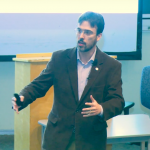Dr. Oliveira was awarded an early career grant from the Global Network on Financial Geography (FinGeo) and the journal Environment and Planning A
The award was presented at the 1st FinGeo Global Conference on Financial Geography, Beijing Normal University, Beijing, China, September 14 – 18, 2019. It was awarded for Dr. Oliveira’s presentation of his new research on “Chinese finance in Brazil: Collective information-seeking investments as drivers of financial internationalization”, co-authored with Dr. Canfei He, professor of economic geography and dean of the College of Urban and Environmental Sciences, Peking University.

